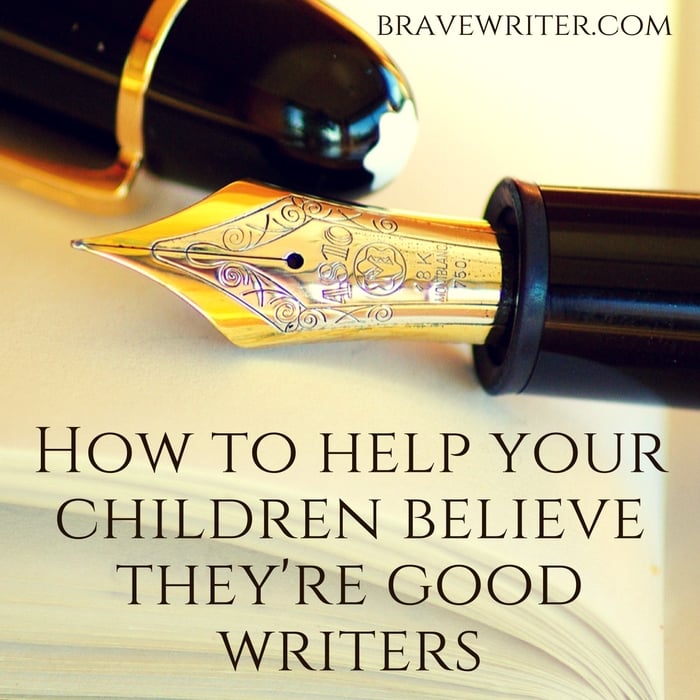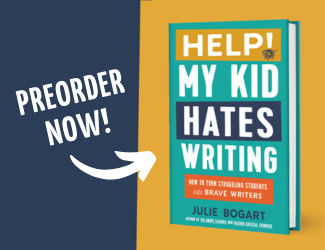Email: What if my daughter doesn’t believe she’s a good writer?

Hi Julie,
My 13 year old daughter reluctantly participated, ( I made her! ) in a Teen writing contest at our library. Much to her surprise, she won first place in the personal narrative category for 7-9 grade. My question is, how do you convince these kids that they have been blessed with talent??? She doesn’t believe me that her story was good, nor anyone else that has said so. This is our 3rd year to homeschool, while using The Writer’s Jungle.
Help!!
Thanks so much for reading.
Mary
Hi, Mary!
Some mothers would say, “That’s a great problem to have!” But when it’s your problem, it sure feels strange. You want your kids to feel valued and that their skills are ones they can count on. When they don’t see it, you want to insist more: “You’re great at this. Why can’t you see it?”
I like to start with what’s real. If your daughter feels she is not a good writer, then allow her to have that point of view. You might even say something like, “It must feel weird to receive an award for your writing when you don’t think you’re very good at it. What’s it like to feel that way?” Give her the chance to say the truth for her so that she isn’t always having to defend a position (which tends to entrench any of us in a position, sometimes more than we feel it).
I would also admire her for writing and submitting a story when she feels that her writing isn’t up to her standards. Let her know that you are impressed with that kind of perseverance and that you are looking forward to the day when her efforts to be a good writer match her evaluation of herself.
The truth is, when kids are talented, they are also much more able to see the flaws in their work. They have higher standards for themselves, they have more critical ability (that’s what makes them good writers to begin with).
So when we keep insisting that they are good when they don’t see it, they put those comments down to the person (or people) not having the skills to evaluate. This process is intuitive (they don’t say to themselves, “My mom doesn’t know how to judge writing”). They just know that what they are reading doesn’t feel as good as they thought it would and so anyone who says otherwise must not be able to evaluate writing.
To help your daughter grow into one who has a more balanced view of her efforts, make sure that you are very specific in your praise. Identify ONE good word pair or clever phrase or moving sentence. Don’t say “what a good writer she is” in general. Make the most of the specific things she does well.
“I really like the way you hooked me with your opening line. I wanted to know what would happen next.”
“You write such vivid descriptions. The blood-orange moon against the night sky made me think of Halloween and creepiness.”
Don’t say, “You write such great stories. Everybody loves them.”
See the difference? One enables her to understand what you see that is worth repeating and admiring, the one thing that works, the one thing that is a skill she can rely on. The other comment means she has to live up to some ideal that she doesn’t feel she’s achieved. That’s a lot of pressure! So take the pressure off. Honor her point of view and offer concrete compliments.
I hope that helps!
Julie



















That sounds like great advice but it might also be helpful to help her understand what the standards are for things like competitions, publications, etc. I have seen many academics, for example, who keep revising and revising and never send the paper off for publication because it isn’t quite right yet. It seems to me that one of the skills that good writers need is the ability to see when something is good enough. Writing can always be improved, but at some point, it is worth calling a project finished and sending it off (to a competition, a magazine or whatever) and going on to the next project. And sometimes that sending off isn’t the end, because you will get comments from an editor which can be very helpful.
do you have guidance on how to develop that sense?
It sounded to me from the email that the daughter wasn’t interested in competing but did so because her mother “made her.” So my comments flowed from the place where the daughter is reluctant to embrace her gifts on any level, not that she is reluctant to submit her writing.
I agree that there has to be a point at which a person is finished with the project (book, essay, article, poem) even when it feels like it could still stand improvement. For perfectionists, then, it is critical to develop a relationship with someone she trusts. A trusted editor (mother, friend, father, teacher) is vital to growing when you are a perfectionist. But that trust can’t grow as easily when there is a sense that the editor is falsely propping up what the writer estimates is poor writing.
So if you give real feedback (focus on the areas of strength) and support the child’s evaluation of the writing at the same time (you could do this by asking the child to show the places where she sees the need for revision and discovering how she sees her own writing), you will develop into someone she can trust to give her real feedback which may include your suggestion: “Good enough.”